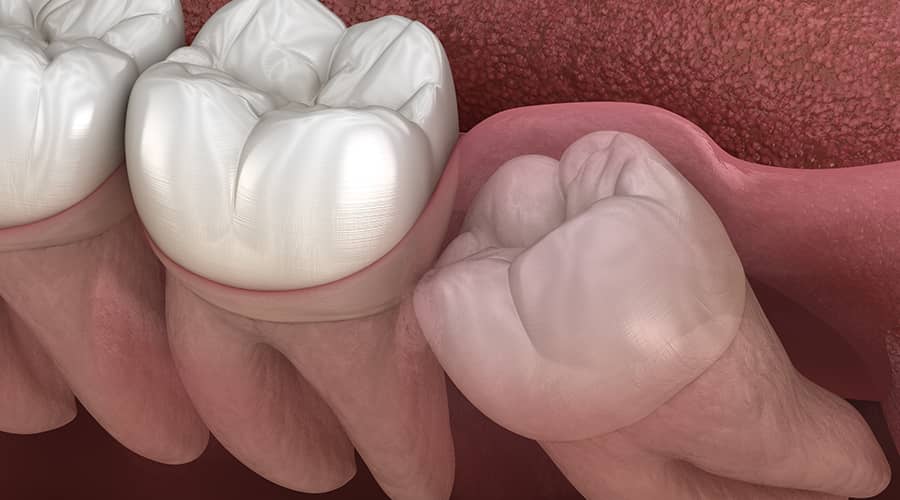
Wisdom teeth are the last set of molars to emerge in a person’s mouth, usually in the late teens between the ages of 17 to 25. For some people, these adult teeth can cause numerous dental problems, such as overcrowding nearby teeth and misalignment. Impacted wisdom teeth occur when there isn’t enough room in the jaw for the teeth to grow in properly. These impacted teeth can cause pain and discomfort and lead to other dental issues if not treated. If wisdom teeth are impacted, they will need to be removed to prevent further problems.
Soft Tissue Impaction vs. Partial Impaction vs. Hard Tissue Impaction
When it comes to impacted wisdom teeth, there are three main types: soft tissue impaction, partial impaction and hard (full bone) impaction.
Soft tissue impaction is when the crown (the visible part of the tooth) has partially erupted through the gum but not enough for it to be fully functional. Because these teeth are partially exposed, they can be more prone to infection and decay.
Partial impaction is when the tooth is covered by gum tissue and is half covered by bone. Basically an intermediate between the soft tissue and hard (full bone) impaction.
Hard tissue impaction is less common and occurs when the wisdom tooth cannot break through the gum at all. These teeth can cause overcrowding due to their position in the jaw, leading to severe pain and discomfort in other areas of the mouth if left untreated.
4 Types of Wisdom Tooth Impaction
There are four different types of wisdom tooth impaction:
Mesial Impaction (Angular)
Mesial impaction is soft tissue impaction in which the wisdom tooth is angled towards the front of the mouth, making it difficult for the crown to break through. It is the most common and may or may not cause issues.
Distal Impaction
Distal impaction is a soft tissue impaction that occurs when the tooth is angled towards the back of the mouth.
Vertical Impaction
Vertical impaction is a type of full impaction. The tooth is in the correct position but hasn’t broken through the gum. Removal is rarely required with this impaction unless it is expected to cause overcrowding.
Horizontal Impaction
Horizontal impaction is a type of full impaction in which the wisdom tooth has grown at an angle, horizontally outwards into the adjacent molar. Surgical removal is usually required in order to prevent further issues, and it is often painful and can lead to many dental issues if left untreated.
How Do Impacted Wisdom Teeth Affect My Oral Health?
Impacted wisdom teeth can cause numerous issues if left untreated. Common issues associated with impacted wisdom teeth include:
- Overcrowding
- Misalignment
- Infection
- Decay
- Damage to the adjacent molars
- Gum disease
- Jaw pain
- Headaches
- Bad taste in the mouth
Bad Breath and Wisdom Teeth
Impacted wisdom teeth can also lead to bad breath (halitosis) because the partially erupted tooth can act as a breeding ground for bacteria which cause bad breath. Practicing good oral hygiene, including regular brushing and flossing, is important to prevent bad breath caused by impacted wisdom teeth.
Treatment for Impacted Wisdom Teeth
If you suspect that your wisdom teeth are impacted or causing other issues, it is important to see an oral surgeon right away. They will be able to determine the best course of treatment for your individual needs. In some cases, impacted wisdom teeth can be removed before they cause any further problems, and removal is usually the best option to prevent overcrowding and other issues.
Summary
- Two types of impaction
- Hard-tissue
- Soft-tissue
- Four different types of wisdom tooth impaction
- Mesial
- Distal
- Vertical
- Horizontal
- Impacted wisdom teeth can cause:
- Overcrowding
- Misalignment
- Infection
- Decay
- Damage to the adjacent molars
- Gum disease
- Jaw pain
- Headaches
- Bad taste in the mouth
The Best Oral Surgeons in Deer Park
At Oral Facial and Implant Specialists, we are committed to providing the best care possible for all our patients. Our team of highly trained and experienced oral surgeons offers a wide range of dental services, including stress-free, impacted wisdom tooth removal. If you have any questions or would like to schedule an appointment, please don’t hesitate to contact us.
If you are searching for wisdom tooth removal in the Deer Park or surrounding area, we are here for you. Call us at (847) 381-0106 or complete the online booking form for a consultation.
Call UsFrequently Asked Questions
In some cases, impacted wisdom teeth can be left in place without causing any issues. However, removal may be recommended if the tooth is expected to cause overcrowding or other dental problems. It is important to consult with your oral surgeon for an individual assessment.
The length of time for the procedure varies depending on the type and severity of impaction. Most impacted wisdom teeth can be removed in one visit, with a recovery period that lasts up to a few weeks. Your oral surgeon will provide detailed information about the procedure and recovery process before beginning any treatment.
In the case of an impacted wisdom tooth, it is important to practice good oral hygiene. This includes brushing and flossing your teeth regularly and using mouthwash. It is also important to brush around the area of the impaction gently to prevent any infection or decay.
If you are waiting for removal, taking an over-the-counter pain reliever such as ibuprofen or motrin (NSAIDS) can often help to relieve any discomfort. DO NOT TAKE Tylenol (Acetaminophen) alongside any narcotic prescription. Applying a cold compress to the jaw area can also provide relief. If your symptoms do not improve, contact your oral surgeon right away as more urgent treatment may be needed.
